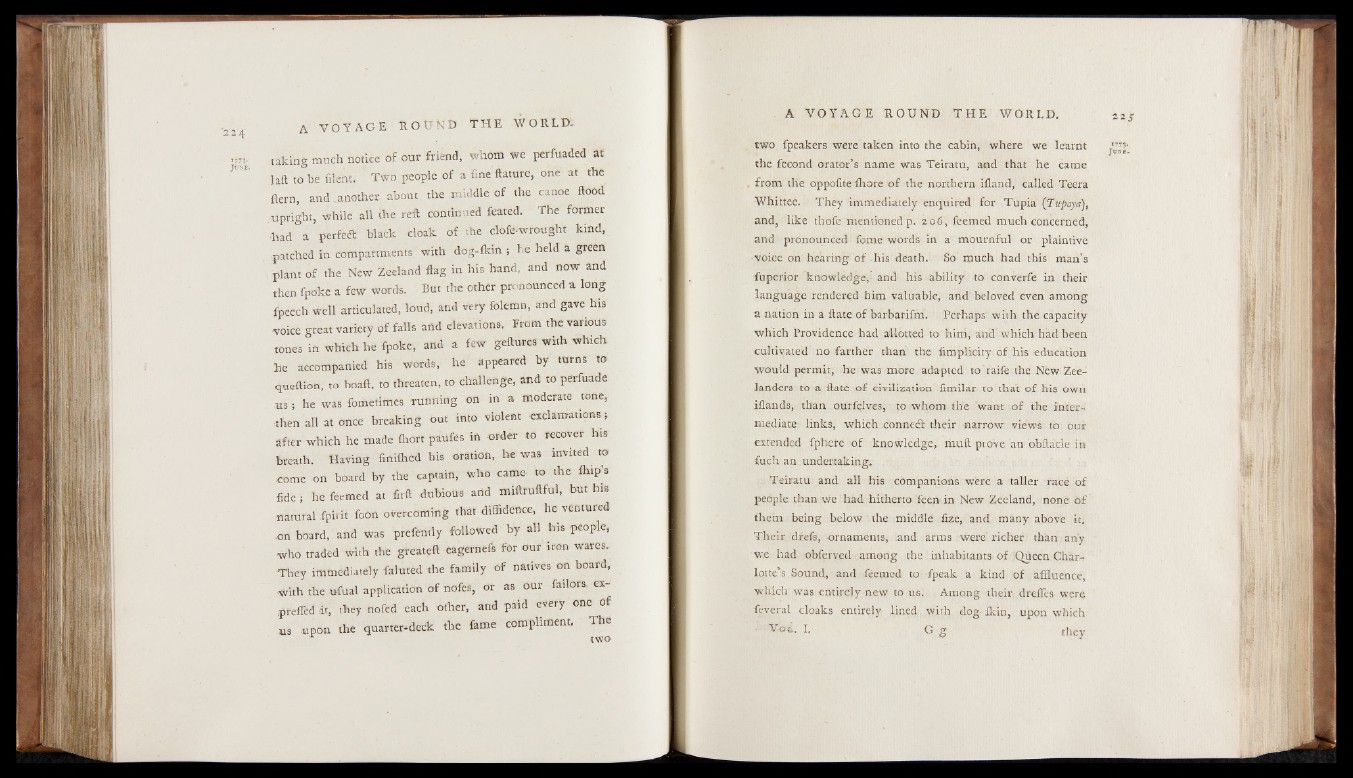
I | taking much notice of our friend, whom we perfuaded at
J jaft to be filent. Two people of a fine ftature, one at the
Pern, and .another about the middle of the canoe ftood
upright, while all the reft continued feated. The former
had a perfect black cloak of the clofe-wrought kind,
■ patched in compartments with dog-fkin ; he held a green
plant of the New Zeeland flag in his hand, and now and
then fpoke a few words. But the other pronounced a long
fpeech well articulated, loud, and very folemn, and gave his
voice great variety of falls and elevations. From the various
tones in which he fpoke, and a few geftures with which
he accompanied his words, he appeared by turns to
queftion, to boaft, to threaten, to challenge, and to perfuade
u s ; he was fometimes running on in a moderate tone,
then all at once breaking out into violent exclamationsf
after which he made ftiort paufes in order to recover his
breath. Having finifhed his oration, he was invited m
come on board by the captain, who came to the fhip s
fide '; he feemed at firft dubious and miftruftful, but bis
natural fpirit foon overcoming that diffidence, he ventured
.on board, and was prefently followed by ail his people,
who traded with the gteateft eagernefs for our iron wares.
They immediately faluted the family of natives on board,
With the ufual application of nofes, or as our failors, ex-
preffed dt, they nofed each other, and paid every one of
us upon the quarter-deck the fame compliment. The
two
two fpeakers were taken into the cabin, where we learnt
the fecond orator’s name was Teiratu, and that he came
from tlie oppofite fhore of the northern ifland, called Teera
Whittee. They immediately enquired for Tupia (Tupaya),
and, like thofe mentioned p. 206, feemed much concerned,
and pronounced fome words in a mournful or plaintive
voice on hearing of his death. So much had this man’s
fuperior knowledge, and his ability to converfe in their
language rendered him valuable, and beloved even among
a nation in a ftate of barbarifm. Perhaps with the capacity
which Providence had allotted to him, and which had been
cultivated no farther than the fimplicity of his education
would permit, he was more adapted to’ raife the New Zee-
landers to a ftate of civilization fimilar to that of his own
iflands, than ourfelves, to whom the warn of the intermediate
links, which connedl their marrow views to our
extended fphere of knowledge, muft prove an obftacle in
fuch an undertaking.
Teiratu and all his companions were a taller race of
people than we had hitherto feen in New Zeeland, none of
them being below the middle fize, and many above it.
Their drefs, ornaments, and arms were' richer than any
w,e had obferved among the inhabitants of Queen Charlotte’s
Sound, and feemed to fpeak a kind of affluence,
which was entirely new to us. Among their drefifes were
feveral cloaks entirely lined with dog- fkin, upon which
' I G g fhey